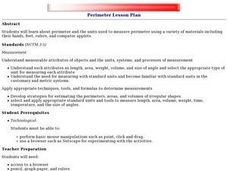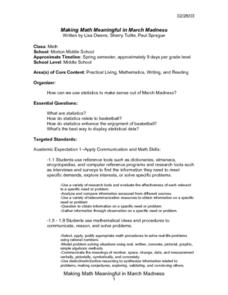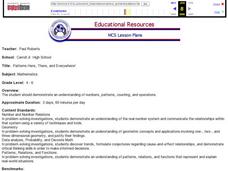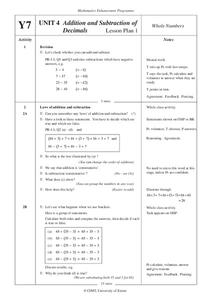Curated OER
Finding Fractional Parts Using an Area Model
Students explore math functions by completing a problem solving worksheet in class. In this division lesson plan, students utilize visual aides such as marshmallows and candy to visualize the act of division. Students complete a division...
Curated OER
Fractions in Clay
Students represent and explain fractions as part of a set using modeling clay. They create sets of objects as specified by individual task cards.
Curated OER
M & Ms in a Bag
Students make predictions about the number and colors of M&M's in a snack size package. They create an Excel spreadsheet to record the data from their small group's bag, create a graph of the data, and discuss the variations of data...
Curated OER
Multiplying Decimals
In this mathematics worksheet, 6th graders estimate the product and use an array to help them find the product. Then they find the exact product and locate where to put the decimal point in each.
Curated OER
Perimeter
In this perimeter worksheet, students, with a partner, problem solve and calculate the answers to twenty word problems and mathematical calculations involving perimeters.
Curated OER
Use Scientific Method to Solve Problems
Students are given a set problem, they use the scientific method to solve the problem using all steps of the scientific research. Students list the steps of the scientific method used in solving a problem. They are given a selected...
Curated OER
ADULT ESOL LESSON PLANS--Maintaining Employment
Students analyze payroll deductions from their pay stubs to view a variety of government services and company benefits. After defining the vocabulary words on the board, they associate those words to certain sections on their pay stubs.
Curated OER
Fractions: Jewish Population of Europe during WWII
Students evaluate population maps and convert fractions to percentages. In this WWII lesson, students use statistics on the Holocaust to determine population loss and change. Students create their own math questions and answers using the...
Curated OER
Picture Frames and Algebra
Students evaluate the area of a picture frame and write algebraic representations. In this algebra lesson, students work in groups to find the area of different picture frames. Students then write algebraic expressions and present...
Curated OER
Making Math Meaningful in March Madness
Students examine the statistics of March Madness, the college basketball tournament. They watch videotaped basketball games to collect data for further analysis using Word and Excel. They analyze the data in a variety of activities...
Curated OER
Math, Chemistry, and Food
Students explore the effects of chemical reactions when cooking. Using the Internet, they research enzymes and then mix jello. They examine their results and test enzyme activity by adding pineapple to the jello. Finally, they test...
Curated OER
Mastering Math Vocabulary- The Three Bears
Integrate reading and math to increase your class' vocabulary. Read The Three Bears by Paul Galdone. Then have your third graders complete a worksheet containing math problems related to the story.
Southern Nevada Regional Professional Development Program
Review Games
Boggle, Jot Thoughts, Trading Cards, Commercial Breaks, Snowball Fight, Bingo, Draw it! Here’s a bunch of review games that would make a great addition to your curriculum library. The games can be easily adapted to address the Common...
Curated OER
Patterns Here, There and Everywhere
Pattern recognition is a skill often used in mathematics. Learners count and sort manipulatives, organize the data into a graph and answer questions about the information displayed. They collect the objects to be used and create patterns...
NYC Department of Records
Citizenship and Elections: The Importance of a Ballot
Approximately 58 prcent of those eligible voted in the 2016 US Presidential election. In an attempt to impress upon learners the importance of voting and voting rights, class members examine primary source documents related to...
Curated OER
Number Sentences
Fifth graders become familiar with problem solving strategies of guess and check and working backwards. They demonstrate the basic concepts of addition, subtraction, multiplication, and division using a math sentence.
Virginia Department of Education
Translate and Evaluate
Hopefully nothing gets lost in translation. Pupils translate between verbal phrases and algebraic expressions. They then use candy to determine what values to substitute into the expressions.
Curated OER
How Big Is Your Head?
Students explore measurement by measuring classmates' heads. They record their measurements and they put the measurements in order from smallest to largest. Students figure the mean, median, mode, maximum, minimum, and range of their...
ESL Kid Stuff
Measuring Parts of the Body
"How tall are you?" "Who has the longest arms?" As part of a study of the names of various body parts, language learners use rulers and tapes to measure parts of the body.
Curated OER
Social Problems
An adult ESL class brainstorm what they believe to be the major problems in Namibia. In groups, they use the list of problems and put them into the order of the most critical and the reasons why. They research possible solutions and...
Curated OER
All About Seeds!
First graders learn all about seeds. In this biology lesson, 1st graders discover: what a fruit is, what is inside of seeds, and how seeds are transported.
Curated OER
Collective Nouns and Verb Agreement Practice
Break down subject and verb agreement with this exercise. This activity only deals with present tense verbs and collective nouns. Pupils learn how to make the verb of a sentence agree with the collective noun by reading sentences and,...
Curated OER
Addition And Subtraction of Decimals
Learners participate in a lesson plan of adding and subtracting decimals. They should review place values with decimals before beginning the lesson plan. The lesson plan also includes sample problems for the teacher to use in direct...
Curated OER
Estimation & Central Tendency
Eighth graders view pictures that show many objects, estimate amount that they think they saw, and take class data from estimation to find the mean, median, mode, and range for the class.

























